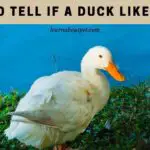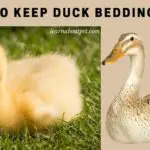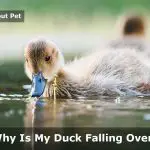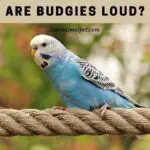It can be rather disconcerting to realize that your ducks are panting. Upon making this observation, you will probably want to know what can make ducks pant, and what (if anything) you can do about the ducks’ panting. Read on, to find the answers.
Why do ducks pant? Ducks may pant when they are too hot. They may also pant because they are stressed. And if a duck’s nostrils are stuffy, it may start to pant.
In situations where the panting is due to being too hot, what one usually needs to do is provide the ducks with lots of cool, fresh water. That alongside adequate shade (and perhaps bottled ice water for them to huddle around and cool their bodies).
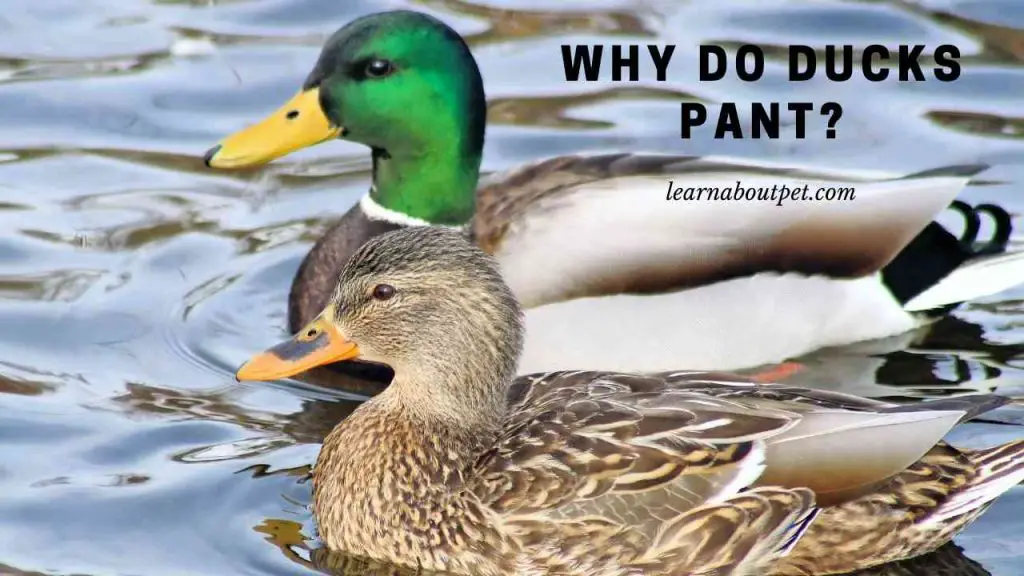
Where the panting is due to stress, what one needs to do is identify the stressors. Then eliminate them, in order to get the duck to stop panting.
And where the panting is due to stuffy nostrils, what one may need to do is provide the ducks with water they can ‘bathe’ in. So this should be water they can dip their entire faces in, and snort out to clear the stuffy nostrils.
Can Ducks Really Pant?
While setting out to answer the why do ducks pant question, a good place to start would be by finding out whether ducks can really pant.
So, indeed, can ducks really pant? The answer is yes. Ducks do really pant.
It is not uncommon to find a duck panting heavily at times. This is different from the case of a duck breathing heavy. It is genuine panting.
Many people who keep ducks do report panting. Therefore duck panting is a real thing. And if you are setting out as a new duck keeper, it is something you should be ready for.
How Do Ducks Pant?
Another key thing we need to learn, in the course of answering the why do ducks pant question, is how the ducks pant.
So far, we have established that ducks can really pant. How do they do it?
Firstly, we need to understand, how do ducks breathe? And as it turns out, under normal circumstances, ducks breathe by drawing in air through organs known as nares, after which the air goes down their tracheas, and into their lungs.
Now when ducks pant, it is mostly through their mouths. What is duck mouth called? The name is a bill. So ducks pant through their bills.
Therefore what you will typically encounter is a duck panting with mouth open. The duck makes audible sound, sometimes similar to that of a dog panting. (That is what leads to the common question on, why do ducks pant like dogs)?
To some people, the panting can still come across as heavy breathing: hence the question, why is my duck breathing heavily? Or why is my duck breathing with mouth open and in a heavy manner?
Therefore what may be at play here is panting.
But there are also cases where the panting is not heavy. This is where it is something akin to squeaking, but with breath sounds intertwined: which differentiate it from ordinary squeaking.
All in all, ducks pant through their mouths. And it entails making unmistakable panting noises.
With this background information, we can now probe deeper into the why do ducks pant question.
Why Do Ducks Pant?
There are three key things that can make a duck pant.
Firstly, a duck may pant because it is too hot. Indeed, most of the people who report incidents of ducks panting also mention that the temperatures are too high at such times.
And that leads to the question, what temperature is too hot for ducklings (or adult ducks for that matter)? And the answer is that temperatures above 90 degrees Fahrenheit may be too high for ducks.
At around 100 degrees Fahrenheit, ducks may start panting. It is important to understand that due to their body structure, ducks get hot easily.
This is why, for instance, they like drinking ice water. So high is their propensity for ice water that people often ask, why do ducks like drinking ice water?
So all in all, duck panting can be due to being too hot. And indeed, if you research on how do I know if my duck is too hot, you will notice that one of the ways to know is if the duck is panting.
Being too hot is the first thing that can make ducks pant.
Secondly, a duck may pant because it is stressed. This stress could be due to some sort of injury. It could also be due to illness. And it can also be on account of humidity or heat.
Generally, panting can be a sign of stress. Whenever experts are answering the question on how do you tell if a duck is stressed, one of the signs they tend to mention is panting.
And if you ask an expert, do ducks pant when stressed, the answer will typically be in the affirmative.
The third and final thing that can make ducks pant is stuffy nostrils.

Why Do Ducklings Pant?
Some of the people who pose the why do ducks pant question turn out to be individuals owning ducklings, rather than mature ducks.
The sight of a panting duckling can be quite unnerving. It almost always leads to the why do ducks panting question. Or, more accurately, why do baby ducks pant?
Now the reasons for ducklings panting are more or less similar to those for adult ducks’ panting.
Therefore the answer we gave, while answering the why do ducks pant question, also applies here.
Firstly, it could be due to the ducklings being too hot. It could also be due to the ducklings being under stress. Or it could be due to the ducklings’ noses being stuffy.
Why Do Muscovy Ducks Pant?
A sizable number of people posing the why do ducks pant question may be owners of Muscovy ducks. This leads to another question: why do Muscovy ducks in particular pant?
And the answer is that Muscovy ducks seem to have a tendency to get hot rather easily. So being too hot is the commonest reason for Muscovy ducks panting.
But when it is under extreme stress, it is also possible to have a Muscovy duck doing a weird panting thing.
And a Muscovy duck with stuffy nostrils may also end up starting to pant.
Why Do Pekin Ducks Pant?
Like all other ducks, Pekin ducks may pant because they are too hot. They may also pant due to stress. And they may pant because of stuffy nostrils.
The latter scenario, of stuffy nostrils, may arise if the Pekin ducks are unable to get suitable water into which to dip their faces and snort.
That almost always leads to heavy breathing, and often the question, why is my duck breathing and panting heavily? Or why do ducks look like they are panting, yet they don’t seem to be under stress or too hot?
Yet most people who attempt to answer the why do my ducks pant question typically overlook this possibility, of it being due to stuffy nostrils. That is with regard to Pekin ducks and really all other types of ducks.
My Duck Is Panting – What To Do?
Right after the why do ducks pant question usually comes this one: on what to do about the panting.
Therefore while answering the why do ducks pant question, it is important to mention something with regard to what one needs to do about the panting.
Now where the panting seems to be due to the ducks being too hot, you need to find out ways of cooling them. First provide them with adequate shed. Then give them lots of fresh, cool water.
And consider putting bottles of ice water where they hang out, so that they huddle around them to cool their bodies down.
Where the panting seems to be due to stress, figure out what is stressing the ducks. Is it the humidity? Is it an injury? Or could it be a sickness? Further, could it be something they perceive as a potential predator?
Identify the culpable stressors, then eliminate them, to make the ducks stop panting.
Where it is apparently due to stuffy nostrils, just provide the ducks with plenty of ‘bath’ water, into which they can immerse their faces and snort. This should clear the nostrils.
And where it is impossible to identify the cause, consider consulting a vet.
Final Verdict – Why Do Ducks Pant
Ducks may pant when they are too hot. They may also pant because of stress – which could be due to things like excess humidity, injury, illness, the presence of perceived potential predators and so on.
Ducks may also pant when their nostrils get stuffy.

Once you identify the reason behind a duck’s panting, you can take corrective measures so that the duck stops panting.
Where the reasons for a duck’s panting are impossible to identify, or where your corrective measures don’t seem to work, it may be best to consult a vet.
As a pet lover, make sure to learn about pet more and give your pet duck a good and comfortable life!

Welcome to Learn About Pet. My name is Rajkumar Ravichandran and I love all pets, travel, and amazing food. I write about my passion and personal experience caring for multiple pets in this blog! ❤️
Post Disclaimer
DISCLAIMER: THIS BLOG OR WEBSITE, "Learn About Pet", DOES NOT PROVIDE YOU WITH MEDICAL ADVICE AND IS NOT A SUBSTITUTE FOR MEDICAL ADVICE. ALWAYS GET IN TOUCH WITH YOUR PERSONAL VETERINARIAN AND USE INFORMATION HERE AS GENERAL ADVICE.
The information, including but not limited to, text, graphics, images and other material contained on this website are for informational purposes only. No material on this site is intended to be a substitute for professional veterinary advice, food recommendation, diagnosis, or treatment. Always seek the advice of your veterinarian or other qualified health care provider with any questions you may have regarding a medical condition or for pet food related questions.
